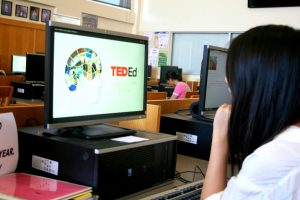Modified iPrism firewall allows students to access previously banned sites on any device while on campus.
Students this year gain greater Internet freedom for educational purposes with the iPrism lift. The iPrism firewall no longer blocks sites such as YouTube and Facebook, allowing students to access these sites openly anywhere and anytime on campus.
“The intent behind [the lift] is to provide easier access for kids to access our extended learning environment,” said Dean of Students, Nico Flores. “You guys are the experts in the classroom, and we want you to be connected as best as possible, with the idea behind is that it is used for educational purposes.”
Facebook provides a forum where groups discuss information and answer related questions. Many students use the Facebook groups to post additional resources and communicate with classmates. In previous years, with the iPrism filter in place, students who needed quick access to such materials had difficulty getting the information.

“I had a form that someone sent me over Facebook, and I couldn’t access it through the library to print it out,” said sophomore Alexandra Malone. “It was due that day, so that was not helpful.”
Now any resource or piece of information from Facebook can be accessed by students. Furthermore, students can visually learn from YouTube videos in addition to utilizing standard research sites such as Jstor and Google.
“[The lift is] pretty beneficial because we save time and actually use YouTube to help study for our tests,” junior Jahnavi Meka said. “I used YouTube especially for Chemistry Honors last year for redox reactions, because I didn’t really get them — and the videos from YouTube really helped. Now we have more options to do our homework at school. I have a free fourth period, so if I don’t have enough time to do it at home, I can always do it in my free fourth period.”
Chemistry teacher Kavita Gupta has heavily incorporated YouTube into her curriculum for the past two years. She publishes a YouTube podcast overview for each chapter in the syllabus, and she expects students to watch these at home so she can expand on the concepts covered in class.
“My podcasts are on YouTube, [and] on their free time [at] school [they can] watch those if they really meant to use the time wisely,” Gupta said. “They can go on [the] Facebook group and do the discussion or see what the new resources are. If they go there — and not waste their time — they can definitely use that time more efficiently to learn.”
However, the iPrism settings were modified for educational reasons only. This is why certain social media websites such as Tumblr and Twitter are still blocked, as administration does not see educational value in them.
“The idea is that we want to make sure that we protect the learning environment,” Flores said. “So some things are still blocked that don’t necessarily add to the learning environment or add to educational resources.”
Flores feels that it ultimately falls on the students to use common sense and effectively utilize their time.
“It’s a great opportunity for [students] to really show their citizenship, their ability to make the right decision when there is not someone right on top of them monitoring, and to use this resource that is given to us in a proper way,” Flores said.







